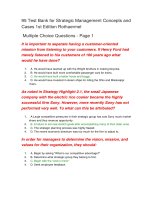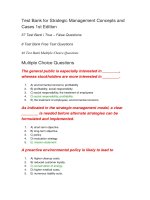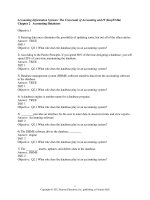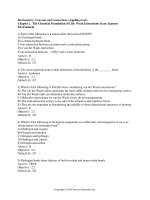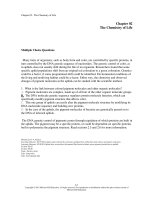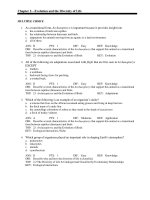Strategic management concepts and cases 1st edition ali test bank
Bạn đang xem bản rút gọn của tài liệu. Xem và tải ngay bản đầy đủ của tài liệu tại đây (269.48 KB, 13 trang )
TRUE/FALSE. Write 'T' if the statement is true and 'F' if the statement is false.
1) Vision and mission statements can often be found in the front of annual reports.
1) _______
2) Although it is important for companies to have a clearly defined mission statement, research has
shown that less than 50% of all companies have used a mission statement in the previous five
years.
2) _______
3) The foundation for development of a comprehensive mission statement is provided by a clear
vision.
3) _______
4) The mission statement should be short – preferably one sentence.
4) _______
5) When developing a vision statement, input should be received from as many managers as
possible.
5) _______
6) If an organization chooses to have both mission and vision statements, the mission statement
should be established first.
6) _______
7) According to Peter Drucker, asking the question "What is our business?" is synonymous with
asking the question "What is our vision?"
7) _______
8) A mission statement is a declaration of an organization's "reason for being."
8) _______
9) A mission statement, sometimes called a creed statement, can be defined as an "enduring
statement of purpose that distinguishes one organization from other similar enterprises."
9) _______
10) There is no need for a mission statement in small, nonprofit organizations.
10) ______
11) A mission statement is a declaration of an organization's financial status.
11) ______
12) A mission statement can sometimes be called a statement of philosophy.
12) ______
13) Carefully prepared statements of vision and mission are widely recognized as the first step in
strategic management.
13) ______
14) An important question a mission statement should answer is, "What do we want to become?"
14) ______
15) Whereas the mission statement answers the question "What do we want to become?," the vision
statement answers the question "What is our business?"
15) ______
16) In order to motivate a workforce effectively, both profit and vision are needed.
16) ______
17) When developing a mission statement, it is usually advisable to involve as few managers as
possible.
17) ______
18) The first step in the process of developing a mission statement is to ask all participants to
prepare what they believe the organization's mission should be.
18) ______
19) According to Campbell and Yeung, the process of developing a mission statement should create
an "emotional bond" and "sense of mission" between the organization and its employees.
19) ______
20) According to Campbell and Yeung, an organization's vision is associated with behavior and with
the present.
20) ______
21) According to King and Cleland, carefully developed and written mission statements help to
ensure unanimity of purpose within the organization.
21) ______
22) Research has failed to find a positive relationship between mission statements and
organizational performance.
22) ______
23) Mission statements are sometimes difficult to derive because top management may disagree
over company objectives.
23) ______
24) The most important time for a company to develop a mission and vision statement is when the
company is experiencing financial difficulty.
24) ______
25) In multidivisional organizations, each division should develop a mission statement independent
of the parent company.
25) ______
26) Mission statements provide managers with a unity of direction that transcends individual,
parochial and transitory needs, by promoting a sense of shared expectations among all levels
and generations of employees.
26) ______
27) A mission statement promotes a sense of shared expectations among all levels and generations
of employees.
27) ______
28) The question "What is our business?" should be asked whether a company has been successful or
not.
28) ______
29) A mission statement is usually a simple statement of specific beliefs.
29) ______
30) A mission statement should be broad enough to reconcile differences between an organization's
various stakeholders.
30) ______
31) Stakeholders of an organization include stockholders, customers and creditors, but not
competitors.
31) ______
32) Individuals who own stock in a corporation are considered stakeholders.
32) ______
33) Stakeholders both affect and are affected by an organization's strategic decisions.
33) ______
34) Mission statements should be stated with a high level of precision.
34) ______
35) A good mission statement shows the relative attention an organization will devote to meeting
the claims of various stakeholders.
35) ______
36) Precision might stifle creativity in the formulation of an acceptable mission or purpose.
36) ______
37) In Saudi Arabia, the Presidency of Meteorology and Environment has developed specific
guidelines for public and private institutions to implement the Kingdom's strategy for protecting
the environment and preserving wildlife.
37) ______
38) In most cases, several paragraphs are required for a mission statement.
38) ______
39) An effective mission statement generates the impression that a firm is successful, has direction,
and is worthy of time, support and investment.
39) ______
40) According to Vern McGinnis, an effective mission statement should define what the
organization is and what the organization aspires to be.
40) ______
41) It is generally a good idea to use the mission statement as a guide when completing an external
and internal analysis.
41) ______
42) Good mission statements identify the utility of a firm's products to its customers.
42) ______
43) Attracting customers is a major reason for developing a mission statement.
43) ______
44) Social policy should be designed and articulated during the strategy-implementation stage.
44) ______
45) During the strategy-implementation process, social policy should be set and administered.
45) ______
46) Social policy should be reaffirmed or changed during strategy implementation.
46) ______
47) Corporate policies related to mandatory retirement are a growing concern in many counties.
47) ______
48) In 2007, Arabian Business magazine rated Saudi German Hospital (KSA) as a highly socially
responsible corporation.
48) ______
49) In the Arab region, social responsibility is increasingly viewed as part of normal business
conduct.
49) ______
50) A good mission ststement describes an organization's purpose, customers, products or services,
markets, philosophy, and basic technology.
50) ______
51) Japan's national debt is difficult to reduce largely because the country does not view
immigration as a good means to offset declines in the number of workers.
51) ______
52) The percentage of foreign workers within the total population is greater in the United Kingdom
than in the United States.
52) ______
53) A firm's philosophy in a mission addresses the question, "What is the firm's distinctive
competence?"
53) ______
54) A firm's concern for employees in a mission addresses the question, "Is the firm responsive to
social, community, and environmental concerns?"
54) ______
55) According to Peter Drucker, developing a clear business vision and mission is the first
responsibility of strategists.
55) ______
56) Environmental changes should not change a mission statement.
56) ______
57) A well-conceived mission statement is the cornerstone of effective strategic management.
57) ______
MULTIPLE CHOICE. Choose the one alternative that best completes the statement or answers the question.
58) The vision and mission statement can often be found
58) ______
A)
B)
C)
D)
E)
on community news bulletins.
in annual reports.
on supplier invoices.
in the SEC report.
on customer receipts.
59) According to recent studies, what percentage of companies have used a mission statement
sometime in the past five years?
A) 75%
B) 90%
C) 30%
D) 15%
E) 60%
59) ______
60) Which of these basic questions should a vision statement answer?
A) What is our business?
B) Who are our competitors?
C) What do we want to become?
D) Who are our employees?
E) Why do we exist?
60) ______
61) Which of the following should be defined first and foremost?
A) Vision
B) Competitive advantage
C) Mission
D) Objectives
E) Strategic
61) ______
62) The ideal length of a vision statement is
A) as long as necessary to convey the message.
B) one page.
C) several sentences.
D) several paragraphs.
E) one sentence.
62) ______
63) Who is referred to as "the father of modern management?"
A) Peters
B) McGinnis
C) Deming
63) ______
D) Steiner
E) Drucker
64) What is the first step in the comprehensive strategic-management model?
A) Developing vision and mission statements
B) Establishing long-term objectives
C) Performing internal audits
D) Measuring and evaluating performance
E) Performing external audits
64) ______
65) According to the comprehensive strategic-management model, which step needs to be
completed immediately following the establishment of long-term objectives?
A) Performing external audits
B) Performing internal audits
C) Generating, evaluating, and selecting strategies
D) Developing vision and mission statements
E) Measuring and evaluating performance
65) ______
66) The purpose of a mission statement is to declare all of these except
A) whom it wants to serve.
B) a statement of purpose.
66) ______
C) an annual financial plan.
D) a statement of beliefs.
E) a reason for being.
67) As indicated in the strategic-management model, a clear ________ is needed before alternate
strategies can be formulated and implemented.
A) short-term objective
B) long-term objective
C) policy
D) evaluation strategy
E) mission statement
67) ______
68) A businesses mission is the foundation for all of the following except
A) plans.
B) work assignments.
C) strategies.
D) priorities.
E) employee wage rates.
68) ______
69) The mission statement answers which of the following questions?
A) Who are our stakeholders?
B) How can we increase profitability?
C) What is our business?
D) What do we want to become?
E) How can we improve ourselves?
69) ______
70) The vision statement answers which of the following questions?
A) What do we want to become?
B) Who are our stakeholders?
C) How can we increase profitability?
D) How can we improve ourselves?
E) What is our business?
70) ______
71) In the process of developing a mission statement, it is important to involve
A) as few managers as possible.
B) the board of directors only.
C) lower-level management only.
D) as many managers as possible.
E) upper-level management only.
71) ______
72) The process of developing a vision and mission statement includes which of these as the first
activity?
A) Requesting to modify the current document.
B) Asking managers to read selected articles about mission statements.
C) Having a brainstorming session on whether the organization should have a mission
statement.
D) Merging several mission statements into one document.
E) Asking managers to prepare a mission statement for the organization.
72) ______
73) After a draft mission statement has been developed, it is important to
A) vote on the mission statement.
B) ask managers to prepare a mission statement for the organization.
73) ______
C) ask managers to seek support for the mission statement from their subordinates.
D) provide a request for modifications, additions and deletions to the mission statement.
E) ask managers to read several articles about mission statements as background information.
74) What can be used to promote unbiased views and to manage the development of the mission
statement more effectively?
A) An internal group
B) A facilitator
C) Surveys
D) A committee of managers
E) Command-and-control
74) ______
75) A study by Rarick and Vitton found that firms with a formalized mission statement have
________ the average return on shareholders' equity compared to those firms without a
formalized mission statement.
A) five times
B) half
C) three times
D) one quarter
E) twice
75) ______
76) Business Week reports that firms using mission statements have ________ percent higher return
on certain financial measures than those without such statements.
A) 57
B) 10
C) 54
D) 15
E) 30
76) ______
77) King and Cleland recommend that organizations carefully develop a written mission statement
for all of the following reasons except
A) to ensure unanimity of purpose within the organization.
B) to provide a basis for allocating organizational resources.
C) to facilitate the translation of objectives into a work structure involving the assignment of
tasks to responsible elements within the organization.
D) to establish a general tone or organizational climate.
E) to ensure a command-and-control structure.
77) ______
78) What is needed before people can focus on specific strategy formulation activities when
developing a mission statement?
A) Compromise
B) Negotiation
C) Eventual agreement
D) A and B
E) all of the above
78) ______
79) According to Drucker, when is the best time to develop a mission statement?
A) When the firm is in financial trouble
B) When the firm encounters competition
C) When the firm is successful
D) Before a business is opened
E) When the firm is in legal trouble
79) ______
80) What is likely to happen if a mission or vision statement is implemented during troubled times
for a firm?
A) Profitability will decline.
80) ______
B)
C)
D)
E)
Nothing.
Managers will be unable to resolve divergent views.
Employees will ignore the new mission or vision statement.
The firm will experience a reverse in the decline of profitability.
81) Which group would not be classified as a stakeholder?
A) Communities
B) Banks
C) Employees
D) competitors
E) Suppliers
81) ______
82) All stakeholders
A) have ownership rights in an organization.
B) have environmental concerns as their top priority.
C) have the same claims and concerns about an organization.
D) have the same voting rights in an organization.
E) have claims and concerns about an organization, but these claims and concerns vary.
82) ______
83) The three characteristics of a mission statement are a declaration of attitude, a declaration of
social policy and
A) a customer orientation.
B) an employee orientation.
C) a shareholder orientation.
D) an environmental orientation.
E) a profit orientation.
83) ______
84) The potential for creative growth for the organization can be limited by
A) not enough emphasis on stakeholders.
B) an overemphasis on stakeholders.
C) a mission statement that is too dynamic.
D) a mission statement that is too specific.
E) a mission statement that is too general.
84) ______
85) A proactive environmental policy is likely to lead to
A) higher cleanup costs.
B) reduced customer loyalty.
C) conservation of energy.
D) higher medical costs.
E) numerous liability suits.
85) ______
86) The general public is especially interested in ________, whereas stockholders are more interested
in ________.
A) environmental concerns; profitability
B) profitability; social responsibility
C) social responsibility; the treatment of employees
D) social responsibility; profitability
E) the treatment of employees; environmental concerns
86) ______
87) In developing a mission statement, arousing emotion
A) is important.
B) should be avoided if possible.
87) ______
C) is counterproductive.
D) is not a benefit.
E) is the most important goal.
88) According to McGinnis, a mission statement should be all of the following except
A) it should serve as a framework for evaluating both current and prospective activities.
B) it should be specific enough to control creative growth.
C) it should distinguish an organization from all others.
D) it should define what an organization is.
E) it should be stated in clear terms.
88) ______
89) An effective mission statement is all of the following except
A) it provides useful criteria for selecting among alternative strategies.
B) it reflects judgments about future growth directions that are based upon forward-looking
external and internal analyses.
C) it provides a basis for generating and screening strategic options.
D) it is static in orientation.
E) it should include options that are considered less promising.
89) ______
90) Good mission statements identify the ________ of a firm's products to its customers.
A) popularity
B) price
C) profit margin
D) demand
E) utility
90) ______
91) Which of these examples of a mission statement's focus area is not effective?
A) Starbucks focuses on the café experience rather than coffee.
B) AT&T focuses on communication rather than telephones.
C) Universal Studios focuses on entertainment rather than movies.
D) Union Pacific focuses on transportation rather than railroads.
E) Exxon/Mobil focuses on oil and gas rather than energy.
91) ______
92) Corporate social policy should be designed and articulated during which phase of strategy
development?
A) Evaluation
B) Formulation
C) Implementation
D) Management
E) Control
92) ______
93) The corporate social policy should be reaffirmed or changed during which phase of strategy
development?
A) Evaluation
B) Implementation
C) Mission
D) Formulation
E) Control
93) ______
94) In 2009, which of the following companies was ranked as the most admired company for social
responsibility, according to Fortune magazine?
A) Starbucks
94) ______
B)
C)
D)
E)
Walt Disney
IBM
Anheuser-Bush
Toys "R" Us
95) In 2009, which of the following companies was ranked as the least admired company for social
responsibility, according to Fortune magazine?
A) Navistar International
B) Circuit City Stores
C) UPS
D) Toys "R" Us
E) McDonalds
95) ______
96) In regard to its elderly workforce, Japan varies from the United States in that
A) Japan is phasing in a shift from ages 65 to 60 as the date when a pension can be received.
B) a smaller percentage of Japan's senior citizens work.
C) most Japanese workers retire before 60.
D) Japan does not have laws banning discrimination based on age.
E) Japanese citizens are required to retire at 60.
96) ______
97) Which country has the lowest percentage of foreign workers to the total population?
A) Saudi Arabia
B) United States
C) UAE
D) United Kingdom
E) Japan
97) ______
98) Effective mission statements can vary in
A) specificity.
B) content.
C) format.
D) length.
E) all of the above
98) ______
99) Which component of a mission statement addresses the firm's distinctive competence or major
competitive advantage?
A) Customers
B) Technology
C) Philosophy
D) Concern for public image
E) Self-concept
99) ______
100) Which component of a mission statement addresses the basic beliefs, values, aspirations, and
ethical priorities of the firm?
A) Self-concept
B) Philosophy
C) Technology
D) Customers
E) Concern for public image
100) _____
101) Which question(s) are not answered in a mission statement?
A) What is our company philosophy or self-concept?
101) _____
B)
C)
D)
E)
What do we want to become?
What technology will we employ to achieve our objectives?
Who are the firm's customers?
What is the purpose of our organization?
102) Which of the following dimensions are not recommended aspects of a mission statement?
A) Strategies
B) Self-concept
C) Customers
D) Concern for employees
E) Markets
102) _____
103) Effective mission statements
A) never require revision.
B) are usually changed every few months.
C) stand the test of time and require little revision.
D) become ineffective in the first year.
E) are usually changed every few years.
103) _____
ESSAY. Write your answer in the space provided or on a separate sheet of paper.
104) Describe why a mission statement is so important in the strategic-management process.
105) Compare and contrast vision statement with mission statement.
106) Explain the process of developing a mission statement.
107) King and Cleland recommend that organizations carefully develop a written mission statement for six
reasons. List and describe five of these reasons.
108) Describe the characteristics of an effective mission statement.
109) A good mission statement effectively reflects the anticipations of customers and reveals the utility that
various products or services offer customers. Give three examples of this.
110) List and define the nine major components of an effective mission statement.
111) Define and give an example of the self-concept component in a mission statement.
1)
2)
3)
4)
5)
6)
7)
8)
9)
10)
11)
12)
13)
14)
15)
16)
17)
18)
19)
20)
21)
22)
23)
24)
25)
26)
27)
28)
29)
30)
31)
32)
33)
34)
35)
36)
37)
38)
39)
40)
41)
42)
43)
44)
45)
46)
47)
48)
49)
50)
51)
TRUE
FALSE
TRUE
FALSE
TRUE
FALSE
FALSE
TRUE
TRUE
FALSE
FALSE
TRUE
TRUE
FALSE
FALSE
TRUE
FALSE
FALSE
TRUE
FALSE
TRUE
FALSE
TRUE
FALSE
FALSE
TRUE
TRUE
TRUE
FALSE
FALSE
FALSE
TRUE
TRUE
FALSE
TRUE
TRUE
TRUE
FALSE
TRUE
TRUE
FALSE
TRUE
TRUE
TRUE
TRUE
FALSE
TRUE
TRUE
TRUE
TRUE
TRUE
52)
53)
54)
55)
56)
57)
58)
59)
60)
61)
62)
63)
64)
65)
66)
67)
68)
69)
70)
71)
72)
73)
74)
75)
76)
77)
78)
79)
80)
81)
82)
83)
84)
85)
86)
87)
88)
89)
90)
91)
92)
93)
94)
95)
96)
97)
98)
99)
100)
101)
102)
103)
FALSE
FALSE
FALSE
TRUE
FALSE
TRUE
B
B
C
A
E
E
A
C
C
E
E
C
A
D
B
D
B
E
E
E
E
C
E
D
E
A
D
C
D
A
B
D
E
E
B
A
D
B
D
E
E
C
B
B
A
C
104) A clear mission statement is essential for effectively establishing objectives and formulating strategies. It reveals
what an organization wants to be and whom it wants to serve. A business mission is the foundation for priorities,
strategies, plans and work assignments. It is the starting point for the design of managerial jobs and for the design
of managerial structures.
105) Many organizations develop both a mission statement and a vision statement. Whereas the mission statement
answers the question, "What is our business," the vision statement answers the question, "What do we want to
become?" When employees and managers together shape or fashion the vision and mission statements for a firm,
the resultant documents can reflect the personal visions managers and employees have in their hearts and minds
about their own futures. Shared vision creates a commonality of interests that can lift workers out of the monotony
of daily work and put them into a new world of opportunity and challenge.
106) A widely used approach to developing a mission statement is first to select several articles about mission
statements and ask all managers to read these as background information. Then ask managers themselves to
prepare a mission statement for the organization. A facilitator or committee of top managers should then merge
these statements into a single document and distribute this draft mission statement to all managers. A request for
modifications, additions and deletions is needed next, along with a meeting to revise the document. To the extent
all managers have input into and support the final mission statement document, organizations can more easily
obtain managers' support for other strategy formulation, implementation and evaluation activities.
107) Students may list and describe any five of the following: 1) to ensure unanimity of purpose within the organization;
2) to provide a basis, or standard, for allocating organizational resources; 3) to establish a general tone or
organizational climate; 4) to serve as a focal point for individuals to identify with the organization's purpose and
direction, and to deter those who cannot do so from participating further in the organization's activities; 5) to
facilitate the translation of objectives into a work structure involving the assignment of tasks to responsible
elements within the organization; 6) to specify organizational purposes and then to translate these purposes into
objectives in such a way that cost, time and performance parameters can be assessed and controlled.
108) The major characteristics of an effective mission statement are a declaration of attitude, a customer orientation and a
declaration of social policy. It needs to be broad, both to reconcile effectively differences among, and to appeal to,
an organization's diverse stakeholders, the individuals and groups of individuals who have a special stake or clain
on the company. In addition to being broad in scope, it should not be too lengthy.
109) Student answers may vary, but could include: 1) SABIC's mission statement, which focuses on concern for survival,
growth and profitability, and self-concept; 2) Etisalat 's mission statement, which focuses only on technology; 3)
Gulf Glass Manufacturing Company's mission statement, which focuses on five components namely, customers,
products and services, concern for survival, growth and profitability, concern for public image, and concern for
employees; and 4) Saudi Research and Marketing Group's mission statement, which focuses on customers, product
and services, markets, and technology.
110) Students should list and define the following components of an effective mission statement: 1) customers, 2)
products or services, 3) markets, 4) technology, 5) concern for survival, growth and profitability, 6) philosophy, 7)
self-concept, 8) concern for public image and 9) concern for employees.
111) The self-concept component of a mission statement asks the question, "What is the firm's distinctive competence or
major competitive advantage?" An example of the self-concept component is, "Our history is full of almost 150 years
of achievements, which mark the growth of Gandour from a factory store to a leading Fast Moving Consumer
Goods (FMCG) producer, with various production sites spread around the globe. " (Gandour)


